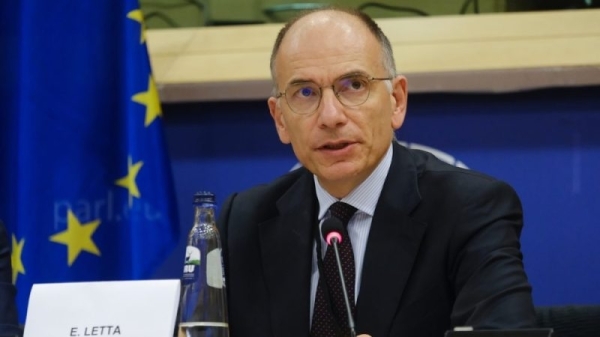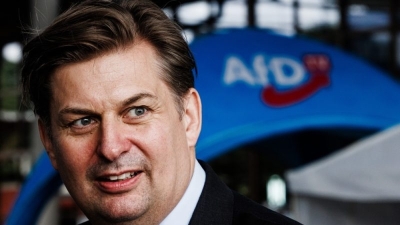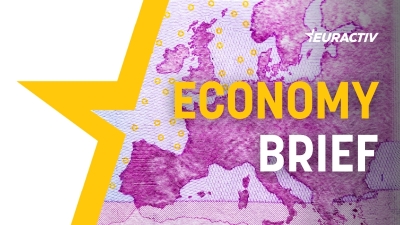EU Single Market report: Letta wants to mimic US tax credits

Former Italian prime minister Enrico Letta, in charge of the long-awaited Single Market Report, wants to propose a tool resembling tax credits used by the US Inflation Reduction Act (IRA), he said on Tuesday (19 March).
Letta, tasked with authoring and presenting a high-level report on the future of the EU’s single market to EU leaders on 17 April, has laid out some ideas of what the report might entail to business leaders at a conference in Berlin on Tuesday (19 March).
In his speech, Letta highlighted the 27-country bloc’s faltering competitiveness against the US, which has been outperforming the EU’s economy in recent years.
To catch up, he would like Europe to mimic the US’s use of tax credits to incentivise domestic investments while simplifying administrative procedures.
As part of its flagship 2022 “Inflation Reduction Act” programme, the US federal government has set out tax credits to promote the roll-out of renewable energy, hydrogen production, and Carbon Capture and Storage (CCS), among others.
“Is it possible to build up something similar in Europe? I would like to propose it because I strongly believe it is one way to be automatic, fast, and to go straight to the point to give the entrepreneur the responsibility to choose mission, targets and objectives” Letta said.
Compared to US tax credits, European support schemes would often involve a lot of paperwork to be filled out, Letta said.

Estonian Prime Minister Kallas uses Berlin trip to warn against ‘dependence’ on state aid
Speaking in Berlin on Tuesday (19 March), Estonian Prime Minister Kaja Kallas warned against increasing reliance on state subsidies, as it posed the risk of taxpayers having to underwrite company losses, while profits were kept private.
Complete the single market in telecoms, energy, finance
Letta also highlighted the need for a joint industrial policy at the EU level, instead of 27 individual ones, as concerns have grown that the use of national subsidies could increase divergencies within the single market.
“National industrial policy is not enough,” he said, highlighting the need to use the dimension of the EU single market to keep up with the US, such as in spending on research and innovation.
Letta also reiterated his calls for the EU to finalise the single market in sectors that were intentionally left out – for geopolitical reasons, he said – when the single market was created in 1993.
At the time – and partly still at present – the integration of energy, telecoms, and financial markets posed more complicated issues than in other areas.
This was due to multiple critical legacy factors including, for energy and telecoms, the fact that many national companies were heavily state-owned, while the physical networks, as well as the sectorial trade arrangements, would entail complex negotiations and processes in order to be substantially modified.
“It’s not by chance that on [those] three – telecoms, energy, and finance – we have a very fragmented system,” Letta said. “So I will strongly argue in favour of a consolidation of these markets. I think it is crucial.”
“There is no industrial policy without energy, […] connectivity, and […] finance, these three are the preconditions to have a strong and effective European industrial policy.”

Eurogroup to urge EU to ease ‘regulatory burden’ on financial sector through CMU revival
A draft Eurogroup statement, obtained by Euractiv, outlines multiple “imperative and urgent” reforms that ministers want to be “taken forward” by the next European Commission
Capital Markets Union not ‘sexy’ but necessary
While for the financial sector, this includes integrating capital markets, Letta said he didn’t like the term Capital Markets Union (CMU) and “will try to propose another”.
“[The term] Capital Markets Union is not very sexy, and I think we need to have a new branding on that,” he said, underlining that the main goal would be to raise money for more risky ideas and innovations.
Letta warned that, at present, many innovative firms leave Europe to raise capital elsewhere.
This was also highlighted by a new report published on Wednesday (20 March) by the Association for Financial Markets in Europe (AFME).
The report focuses on the German backdrop and cites German vaccine makers Biontech and Curevac as meaningful examples of national heavyweights that have chosen the US’s NASDAQ for their public listing instead of a German stock exchange, pointing to a more favourable investor environment.
German companies that have listed abroad have not only grown faster than those listed in Germany (with a turnover growth of +159% compared to +77% in the first three years after the listing), the report shows, but they have also moved more of their business activities outside the country as a result.
This “leads to negative effects for the German economy” and hampers its growth potential, AFME said, warning about similar issues in other EU countries.

German business model not fit for changing times, experts say
The 2023 bump in the German economy is not a short-term phenomenon but shows that many foundations of its business model are no longer suitable for the current rapid shifts in the economy, experts say.
Read more with Euractiv




